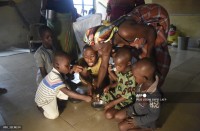(Eagle News) — A new Centers for Disease Control and Prevention study on a group of health care workers showed that COVID-19 mRNA vaccines authorized by the US Food and Drug Administration (FDA) are effective in protecting health care personnel (HCP) against COVID-19 by as much as 94 percent.
In a release from the US CDC, it said that the mRNA vaccines Pfizer-BioNTech and Moderna “reduced the risk of getting sick with COVID-19 by 94% among HCP who were fully vaccinated.”
“This report provided the most compelling information to date that COVID-19 vaccines were performing as expected in the real world,” said CDC Director Rochelle P. Walensky, MD, MPH. “This study, added to the many studies that preceded it, was pivotal to CDC changing its recommendations for those who are fully vaccinated against COVID-19.”
This assessment, conducted in a different study network with a larger sample size from across a broader geographic area than in the clinical trials, independently confirms U.S. vaccine effectiveness findings among health care workers that were first reported March 29, it said.
Data for the new study came from a network covering 500,000 HCP across 33 sites in 25 U.S. states. This provides additional robust evidence that mRNA vaccines are effective against symptomatic illness in real-world conditions, the CDC explained.
“The assessment compared vaccination status of participants who tested positive for SARS-CoV-2, the virus that causes COVID-19 (cases) with vaccination status of those who tested negative (controls). Among the 1,843 participants, there were 623 cases and 1,220 controls. Vaccine effectiveness estimates were calculated by comparing the odds of COVID-19 vaccination in cases and controls. The large sample size in this study allowed for a precise vaccine effectiveness estimate with narrower confidence intervals than earlier CDC findings published March 29.”
The CDC assessment found that COVID-19 symptomatic illness was reduced by 94% among HCP who were fully vaccinated, defined in this study as seven or more days after receipt of a second vaccine dose, and by 82% among those who were partially vaccinated, defined in this study as 14 days after receipt of dose one through six days after dose two.
It noted the importance of getting two doses of the vaccine “to get the most protection.”
“Understanding vaccine effectiveness among HCP is important because they are at higher risk for exposure to SARS-CoV-2 through patient interactions. Vaccination of HCP protects them and their patients against COVID-19 and ensures continuation of critical health care services.”
“This assessment is part of CDC’s comprehensive strategy of using complementary methods to understand how COVID-19 vaccines are working in different populations and real-world settings. On May 12, CDC expanded COVID-19 vaccination recommendations to include adolescents 12 years through 15 years of age under the U.S. Food and Drug Administration’s Emergency Use Authorization. These adolescents are now authorized to receive the Pfizer-BioNTech COVID-19 vaccine. CDC has several surveillance networks that will continue to assess how well FDA-authorized COVID-19 vaccines are working in real-world conditions in people of different age groups, including children and adolescents.”
(With a report from US CDC)







